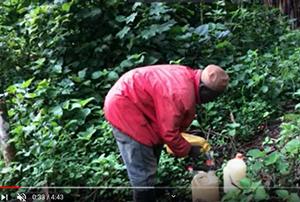Palm Wine Production

- Palm wine is an alcoholic beverage created from the sap of various species of palm tree such as the ´Raphia Palm´.
- It is known by various appellations as matango, mbuh, tumbu liquor, white stuff in Cameroon. It is found in many parts of Asia, Africa the Caribbean and South America.
- Palm wine production by small scale farmers may promote conservation as palm trees become a source of regular household income that may economically be worth more than the value of timber sold.
- The sap is extracted from the cut flower of the palm tree.
- A container is fastened to the flower stump to collect the sap.
- The white liquid that initially collects tends to be very sweet and non-alcoholic.
- Within two hours, fermentation yields an aromatic wine of up to 4% alcohol content, mildly intoxicating and sweet. The wine may be allowed to ferment longer, up to a day, to yield a stronger, more sour and acidic taste, which some people prefer.
Palm wine plays an important role in many ceremonies in the Nso land.Guests at weddings, birth celebrations,and funeral wakes are served generous quantities. Palm wine is often infused with medicinal herbs to remedy a wide variety of physical complaints.As a token of respect to deceased ancestors, many traditional rites begin with a small amount of palm wine spilled on the ground.
Palm wine is enjoyed by men and women, although women usually drink it less, in public venues. A young man who is going for the first introduction at his inlaws is required to come with palm wine.Traditional marriages are contracted with palm wine depending on the custom of the various tribes in some parts of Cameroon.
This culture is similar to those in cities and villages in the neighboring Nigerian (Igbo Land)
A gift for Comundos
Over the years, Comundos has helped remote communities around the world by teaching critical thinking, media literacy and the use of communication technology.
To do this effectively, we need your support for computers, translations, courses and social media management.
Thank you .
BE11 1030 2973 8248




